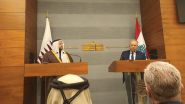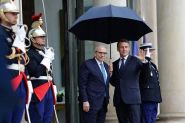
As the United States escalates its initiatives aimed at the disarmament of Hezbollah, the Lebanese government finds itself at a critical juncture, facing a multitude of internal and external challenges. A recent statement from Tom Barrack, the US Ambassador to Turkey, the Presidential Envoy to Syria, and the "de facto envoy" to Lebanon, underscored this urgency, declaring, "Hezbollah has to be gone." This proclamation encapsulates Washington's pressing demand to "neutralize" the militant group's influence and re-establish Lebanese sovereignty.
Central to the US roadmap for Lebanon is the necessity for a "unanimous decision" acknowledging that the state must control all weapons within its borders, including those possessed by Hezbollah. Key political figures—President Joseph Aoun, Prime Minister Nawaf Salam, and Parliament Speaker Nabih Berri—are anticipated to publicly support this commitment. There is also an explicit demand for Hezbollah to make a clear declaration of its intention to disarm, a proposition that remains contentious.
The urgency of disarming Hezbollah is magnified by Lebanon's persistent political and security instability. Barrack's visit served as a stark reminder of the dangers associated with inaction. He conveyed a "clear and firm warning" to Lebanese leaders regarding the ramifications of failing to take decisive action against Hezbollah, stressing the necessity for the complete extension of state authority. This mandate is not merely a call for political change; it represents a push for comprehensive reforms, particularly in Lebanon's judicial and financial sectors.
Former ambassador Ed Gabriel, president of the American Task Force on Lebanon (ATFL), emphasized the critical timing for disarmament, border demarcation, and economic reforms. He told This is Beirut, "Specific expectations and timelines were discussed during Ambassador Barrack's visit. The longer these are missed, the more difficult it will be to secure US support."
Barrack's diplomatic approach to Lebanon, characterized by assertiveness and diplomacy, is perceived as reflecting Washington's "madman" strategy, akin to tactics employed by President Trump. Experts caution that this evolving "maximum pressure" policy could pose significant consequences for Lebanese political figures, who are understandably anxious about potential repercussions should US patience wane. Gabriel reiterated this point, stating, "This is especially true in light of Syria's fast-paced reform movement and the attention Syria is receiving from Gulf countries and other regional allies, as they accelerate security and economic reforms." He added, "Lebanon has made some very timely and important progress...but delaying the fulfillment of the ceasefire agreement and passage of key economic reforms will jeopardize US attention and shift it to Syria and other priorities."
Sources within the White House and State Department express anticipation that Lebanese leaders will adopt more proactive measures regarding disarmament. The consensus is that disarmament "must be immediate and complete." This perspective resonates with many who are keen to avoid a shift from a US. "madman" to an "angry man" policy. Gabriel emphasizes the necessity of implementing key governmental reforms, including bank resolution and restructuring, judicial reform, improvements in public service, and enhanced transparency and governance. He states, "Importantly, resolving border demarcation with Syria and Israel will significantly boost US support for Lebanon."
Hanin Ghaddar, Senior fellow at the Washington Institute, reflects on the transformative changes underway, asserting that Barrack's messages align with the current US administration's strategic pivot towards "cutting Iran's wings." She told This is Beirut, "Restoring state authority in Lebanon and achieving Hezbollah's disarmament are positioned as essential objectives within this strategic change."
American engagement with Lebanon, according to Ghaddar, is evolving in two primary dimensions. Politically, Barrack functions as a "de facto envoy to Lebanon," championing the Abraham Accords and supporting a potential peace process involving Syria and Israel, which also encompasses Lebanon. On the security front, there is a growing belief that Israel may take steps to address the issue of arms in Lebanon if the Lebanese side continues to resist US disarmament demands.
In summary, US diplomatic sources are emphasizing that the pressure for rapid and impactful outcomes is mounting. This urgency aims to encourage Lebanon to break free from what many experts describe as a "Stockholm Syndrome"—a reluctance to confront the complexities of Hezbollah disarmament and a reliance on outdated perceptions.




Comments